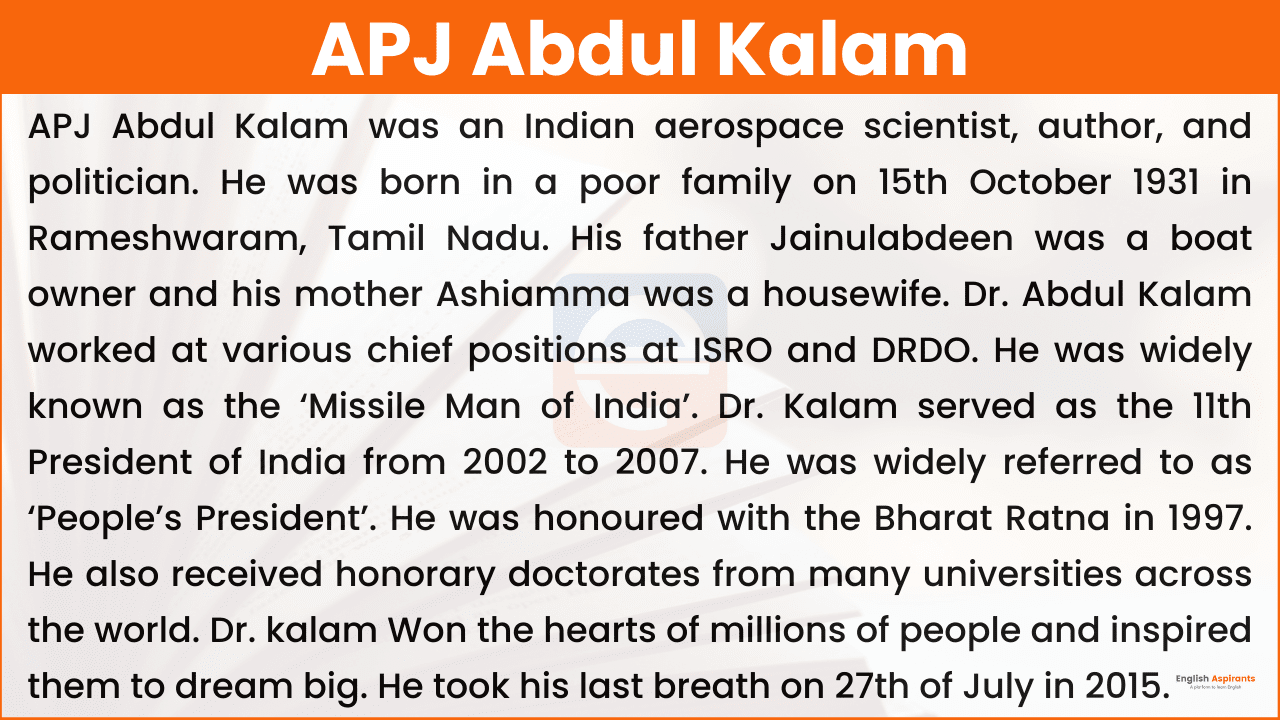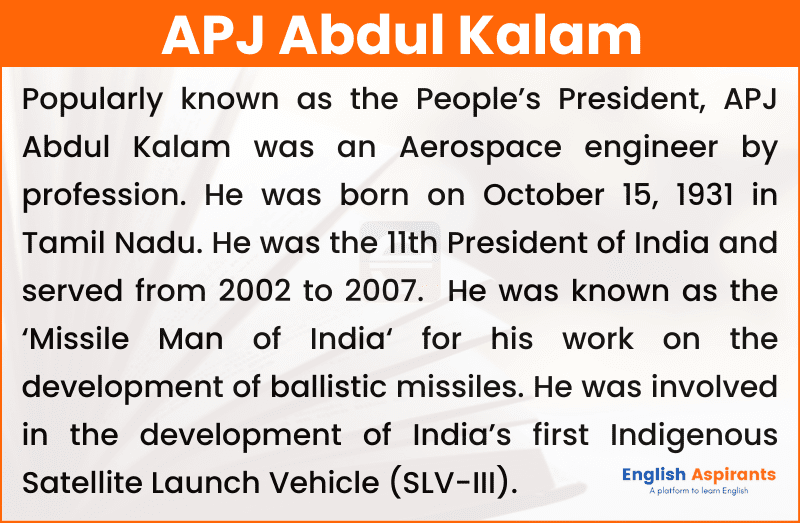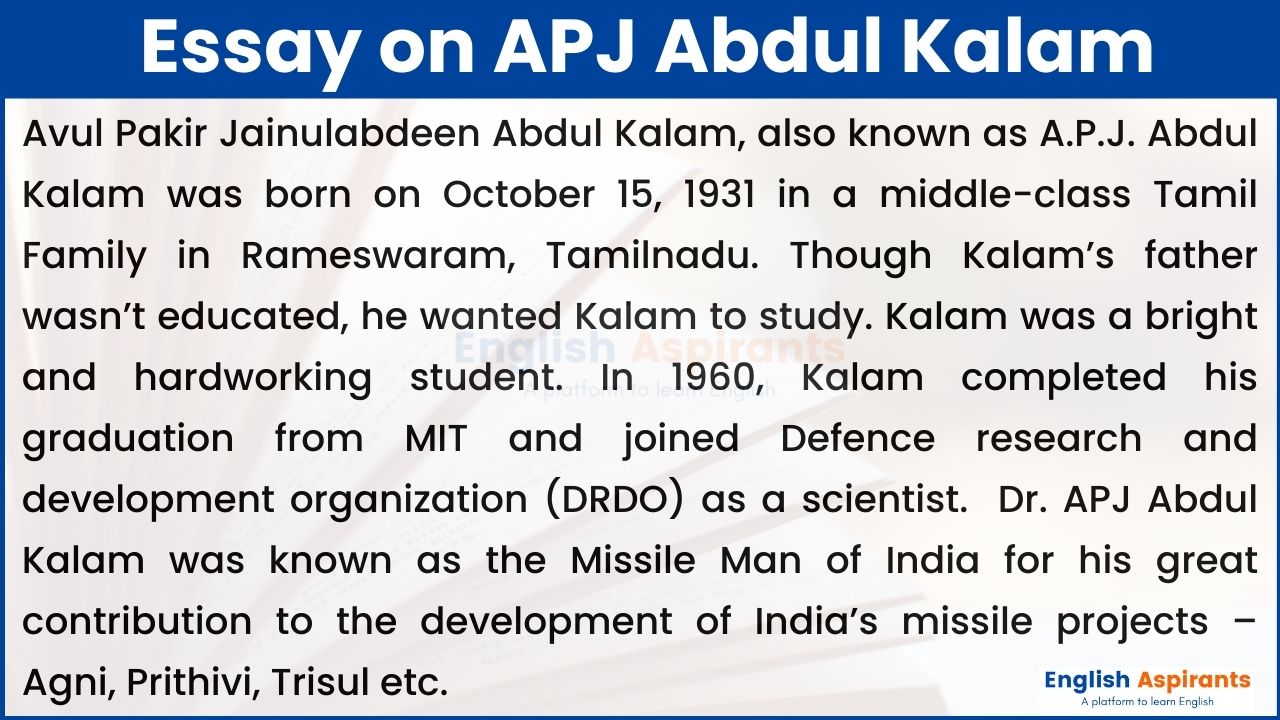APJ Abdul Kalam Essay in English: Dr. A.P.J. Abdul Kalam was an eminent Indian Scientist and administrator. He was a great leader with visionary ideas. In this article, you are going to read 4 essays on APJ Abdul Kalam (100, 200, 300, and 500 words). All the essays will be helpful for the students from class 1 to class 12. So, let’s begin.
Table of Contents
Short Essay on APJ Abdul Kalam: 100 words
APJ Abdul Kalam was an Indian aerospace scientist, author, and politician. He was born in a poor family on 15th October 1931 in Rameshwaram, Tamil Nadu. His father Jainulabdeen was a boat owner and his mother Ashiamma was a housewife.
Dr. Abdul Kalam worked at various chief positions at ISRO and DRDO. He was widely known as the ‘Missile Man of India’. Dr. Kalam served as the 11th President of India from 2002 to 2007. He was widely referred to as ‘People’s President’. He was honoured with the Bharat Ratna in 1997. He also received honorary doctorates from many universities across the world.
Dr. kalam Won the hearts of millions of people and inspired them to dream big. He took his last breath on 27th of July in 2015.

APJ Abdul Kalam Essay in english: 200 words
Popularly known as the People’s President, APJ Abdul Kalam was an Aerospace engineer by profession. He was born on October 15, 1931 in Tamil Nadu. He was the 11th President of India and served from 2002 to 2007
Before his term as the President, Kalam worked as an aeronautical engineer with Defence Research and Development Organisation (DRDO) and the Indian Space Research Organisation (ISRO).
Known as the ‘Missile Man of India‘ for his work on the development of ballistic missile and space rocket technology, he is highly respected as a scientist and as an engineer. He is a man of vision, buzzing with ideas aiming at the development of the country.
Abdul Kalam started his career as a newspaper vendor and grew up in an intimate relationship with nature in his house at Rameshwaram.
Kalam played a crucial technical and political role in India’s Pokhran-II nuclear test in 1998, the first since the original nuclear test in 1974. He was involved in the development of India’s first Indigenous Satellite Launch Vehicle (SLV-III).
He was a professor at Anna University in Chennai and served as visiting faculty at many other academic and research institutions across India.
APJ Abdul Kalam has written several inspirational books, most notably
his autobiography, ‘Wings of Fire’ and ‘Guiding Souls: Dialogues on the purpose of Life’.
He has been conferred with the Padma Bhushan, the Padma Vibhushan, and the prestigious Bharat Ratna. He breathed his last on July 27, 2015. Dr. Kalam will remain in our hearts forever.

Also Read: Paragraph on APJ Abdul Kalam
Essay on APJ Abdul Kalam: 300 Words
Avul Pakir Jainulabdeen Abdul Kalam, also known as A.P.J. Abdul Kalam was born on October 15, 1931 in a middle-class Tamil Family in Rameswaram, Tamilnadu. His father Jainulabdeen was a boat owner and his mother, Ashiamma, was a housemaker. Kalam was the youngest of his siblings. He started working at an early age to help his father in maintaining his family. He used to distribute newspapers to contribute to his family income.
Though Kalam’s father wasn’t educated, he wanted Kalam to study. Kalam was a bright and hardworking student. After completing his school education form Schwartz High School he got admitted to Saint Joseph’s College, Tiruchirappalli. From the college he graduated in Physics in 1954. Then he went to Madras to study aerospace engineering from Madras Institute of Technology (MIT).
In 1960, Kalam completed his graduation from MIT and joined the Defence research and development organization (DRDO) as a scientist. One of his projects at DRDO was to design a small helicopter for the Indian Army. In 1969 he joined Indian Space Research Organization (ISRO) and became the project director of Satellite Launch Vehicle (SLV-Ill). Dr. APJ Abdul Kalam was known as the Missile Man of India for his great contribution to the development of India’s missile projects – Agni, Prithivi, Trisul, etc.
From July 1992 to December 1999, he served as the Chief Scientific Advisor to the Prime Minister and Secretary of DRDO. In 1998 he developed a low-cost coronary stent known as ‘Kalam-Raju Stent’. Kalam served as the 11th President of India from 2002 to 2007. Due to his immense popularity, he was called the People’s President.
Dr. Kalam was bestowed with various awards & honors. He got Padma Bhushan in 1981 and Padma Vibhushan in 1990. In 1997 he was conferred with India’s highest civilian award, Bharat Ratna. He was also conferred with the Degree of Doctorate by 40 Universities. His 79th birthday was recognized as ‘World Students Day’.
He authored several books including Mission India, The luminous Sparks, Wings of Fire (Autobiography), India 2020: A Vision for the new Millennium, Target 3 Billion etc.
Kalam used to interact with young people & children all over the country and encouraged them with his motivational speeches. He died on 27th July 2015 at the age of 83. With his death, we lost a visionary leader of our country. However, he continues to live in the hearts of Indians.

Essay on APJ Abdul Kalam: 500 words
Early Life:
Avul Pakir Jainulabdeen Abdul Kalam, Popularly known as A.P.J. Abdul Kalam was born on October 15, 1931 into a Tamil Muslim family in Rameswaram, Tamil Nadu. His father, Jainulabudeen, was a boat owner. His mother, Ashiamma, Was a Housewife.
By his early childhood, Kalam’s family was struggling to make ends meet. Hence, Kalam, from an early age, took to selling newspapers to supplement his family’s income.
Education:
Kalam completed his school education from the Schwartz Higher Secondary School. After completing his schooling, he got admitted to Saint Joseph’s College in Tiruchirappalli. He completed his graduation in physics in 1954.
In 1955 he went to Madras to study aerospace engineering from the Madras Institute of Technology (MIT).
Career as a Scientist:
After completing his course in aerospace engineering from MIT, Chennai in 1960, he joined the Aeronautical Development Establishment of Defence Research and Development Organisation (DRDO) as a scientist. At the beginning of his career, he designed a small helicopter for the Indian Army.
In 1969, Kalam joined the Indian Space Research Organisation (ISRO) as a project director of India’s first indigenous Satellite Launch Vehicle (SLV-lll). Kalam’s efforts in developing the projects on SLV-lll and Polar SLV from 1970s to 1990s met with success.
He played a vital organizational role in India’s Pokhran-ll nuclear tests in 1998.
From July 1992 to December 1999, he was the secretary of the Defence Research and Development Organization and also the Chief Scientific Advisor to the prime minister.
Kalam is also known as the Missile Man of India for his contribution to the development of ballistic missile and launch vehicle technology.
Leading the Country:
Kalam served as the eleventh President of India from July 25, 2002 to July 25, 2007. During his term as the president of the world’s largest democracy-India-he was affectionately known as the People’s President.
He is known for his inspiring speeches and interaction with the student community in India. His immense popularity led to him being nominated by MTV for a Youth Icon of the Year award in 2003 and 2006.
Kalam, the Author:
Kalam is also famous for his writings. His popular books are-
- Turning Points: A journey through challenges
- Ignited Minds: Unleashing the Power Within India
- Inspiring Thoughts
- My Journey: Transforming Dreams into Actions
- India 2020: A Vision for the New Millennium
- Wings of Fire: An Autobiography
- Target 3 Billion
- You Are Born To Blossom: Take My Journey Beyond
- Envisaging an empowered Nation
Awards & Honours:
In 1981, the Government of India honored him with the Padma Bhushan. He got Padma Vibhushan in 1990 for his work with ISRO and DRDO.
In 1997, India’s highest civilian honor, the Bharat Ratna, was bestowed upon him for his contribution to research and modernization of defence technology in India.
His other prestigious awards include National Nehru Award, Dr. Biren Roy Space Award, etc. He was also conferred with the degree of honorary doctorate by forty universities.
Conclusion:
Dr. Kalam was a person who taught, motivated, and inspired millions across India and also the world. The great leader died on 27th July 2015 at the age of 83. But he has remained alive as a hero who never dies.
Frequently Asked Questions (FAQs):
Abdul Kalam was called Missile Man of India for developing world-class missiles like Agni, Trisul, Prithvi, Akash, etc.
Though he achieved a lot in his life, he lived his life very simply. He used to spend time with children and students. He used to say “For great men, religion is a way of making friends; small people make religion a fighting tool.”
Abdul Kalam died On July 27, 2015, while delivering a lecture at the Indian Institute of Management (IIM), Shillong. He passed away due to a cardiac arrest.
Also Read :
1. Essay on Mother Teresa
2. Paragraph on Mother Teresa
3. Essay on Dr. Sarvepalli Radhakrishnan
4. Essay on Subhash Chandra Bose
5. Essay on Mahatma Gandhi
